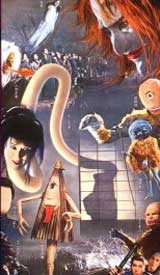 Yokai Monsters: Spook Warfare (Yokai daisenso, 1968) was the first of a trilogy of movies about "yokai" or traditional Japanese "monsters" of folklore. It is alternatively known as Big Monster War or as Ghosts on Parade. Yokai Monsters: Spook Warfare (Yokai daisenso, 1968) was the first of a trilogy of movies about "yokai" or traditional Japanese "monsters" of folklore. It is alternatively known as Big Monster War or as Ghosts on Parade.
The yokai of the first installment include the teapot badger, kappa water imp, a living umbrella, a woman whose neck can grow extremely long, a woman with a second face on the back of her head, a dwarf priest with an enormous gourd-like head, & so on.
These sorts of whimsical monsters derive not only from fairy lore, but from a type of summer entertainment of the Tokugawa Era, comparable to today's Halloween haunted houses, or the "freak shows" of yesteryear but with exclusively phony freaks. Ghosts & long-neck monsters & dancing one-legged umbrellas were trumped up to create "chills" during the hot summers. The longneck woman & such were recreated by tricks or illusions, based on monsters depicted in medieval scrolls; & if their design for the movie is a bit simple & hoky, this makes them all the more representative of what historically was recreated for summer chills.
These rather endearing monsters have to face off & destroy an ancient Babylonian vampire demon who has come to Japan & disguised himself as a samurai lord. Despite that some of the Japanese apparitions are a bit goofy, & too many of the costumes scarsely more than masks without even moving lips as they speak, it is all played very poker-faced & is very charming. It has some beautiful cinematography, much as would be provided in a serious samurai film of the same decade. Viewed in the right mood or with the right friends, it is exciting & hilarious.
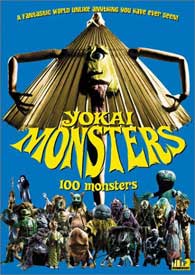 Yoshiyuki Kuroda also directed the famed Lone Wolf & Cub: White Heaven & Hell (1974) &and was the special FX director for the excellent Daimajin trilogy. The Yokai Monsters series is not the equal of Majin at its best, but the Yokai are nevertheless great fun. The first in the trilogy is the most child-oriented of these family films, with the second two films consecutively more serious though none too severe for young viewers. Yoshiyuki Kuroda also directed the famed Lone Wolf & Cub: White Heaven & Hell (1974) &and was the special FX director for the excellent Daimajin trilogy. The Yokai Monsters series is not the equal of Majin at its best, but the Yokai are nevertheless great fun. The first in the trilogy is the most child-oriented of these family films, with the second two films consecutively more serious though none too severe for young viewers.
The same array of monsters return, with new monsters added, in Yokai hyaku monogatari, or Yokai Monsters 2: The Hundred Ghosts aka Hundred Monsters, directed by Kimiyoshi Yasuda, who directed several Zatoichi films, Full Moon Swordsmen/Sleepy Eyes of Death films, & the splendid samurai monster film Majin (Daimajin, 1968).
This film tells a better story than in the first feature, of an Edo gang boss who wants to tear down a tenement & a shrine to build a bordello, & has bought off a corrupt government official to permit the displacement of the city's poor & the destruction of the shrine. A ronin who has been staying in the tenement begins an investigation & the bad-guys begin to suspect he's actually an agent of the High Magistrate, so they want to kill him.
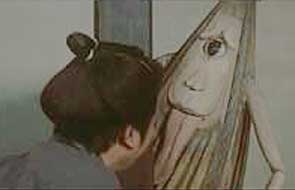 In celebration of their evil partnership, the gang boss throws a party for the lower government official & invite a storyteller who tells ghost stories to the party. This permits a couple interesting short-short stories to be acted out within the larger film. It is traditional to end a night of such storytelling with an exorcism lest actual ghosts & goblins come forth, but the boss & the official don't believe in spirit beings & aggressively refuse to do the ritual. In celebration of their evil partnership, the gang boss throws a party for the lower government official & invite a storyteller who tells ghost stories to the party. This permits a couple interesting short-short stories to be acted out within the larger film. It is traditional to end a night of such storytelling with an exorcism lest actual ghosts & goblins come forth, but the boss & the official don't believe in spirit beings & aggressively refuse to do the ritual.
Thus are released a series of demonic beings intent on punishing all the bad guys. The first Yokai Monsters movie was top-heavy with comedy, & certainly the monsters, based on beings depicted in medieval scrolls, have always been regarded at least partially whimsical.
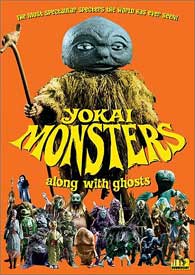 he second film incudes some very spooky stuff that goes beyond the merely comic, especially the faceless ghosts. Humor does remain, especially in the character of a retarded adult who is befriended by the spirit-filled-umbrella. he second film incudes some very spooky stuff that goes beyond the merely comic, especially the faceless ghosts. Humor does remain, especially in the character of a retarded adult who is befriended by the spirit-filled-umbrella.
Third in the Daiei Studios series is Tokaido abaketo chu (1969) or Yokai Monsters 3: Along with Ghosts, aka Journey With Ghosts Along the Tokaido Road, directed by both Yoshiyuki Kuroda & Kimiyoshi Yasuda.
We are treated to a completely different array of traditional monsters, awakened by the spilling of blood on sacred ground along the Hokaido Road. The little girl Miyo (Masami Burukido) has only her grandfather, a shrine caretaker. When he is killed by a gang boss, the little girl sets out all by herself, soon joined by a little boy (Pepe Hozumi).
The addition of orphans to the story increases its appeal to children, & the idea that eerie monsters might protect such children would keep it from being frightening to even the most impressionable child. Even so, the monsters are less satiric this time out, & more convincing.
The countryside's weird spirits are strange but unquestionably good-guys. They haunt everyone but harm only the very bad. The story is well told & a much more serious in tone than were the first two episodes, mature enough to be the most enganging for adult members of the family.
copyright © by Paghat the Ratgirl
|
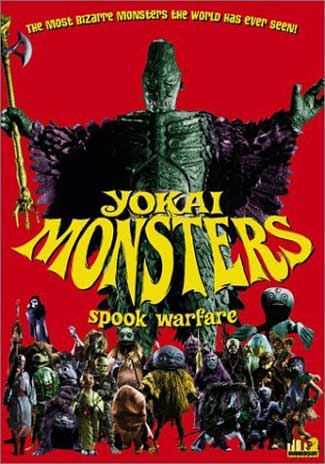

 Yoshiyuki Kuroda also directed the famed Lone Wolf & Cub: White Heaven & Hell (1974) &and was the special FX director for the excellent Daimajin trilogy. The Yokai Monsters series is not the equal of Majin at its best, but the Yokai are nevertheless great fun. The first in the trilogy is the most child-oriented of these family films, with the second two films consecutively more serious though none too severe for young viewers.
Yoshiyuki Kuroda also directed the famed Lone Wolf & Cub: White Heaven & Hell (1974) &and was the special FX director for the excellent Daimajin trilogy. The Yokai Monsters series is not the equal of Majin at its best, but the Yokai are nevertheless great fun. The first in the trilogy is the most child-oriented of these family films, with the second two films consecutively more serious though none too severe for young viewers. In celebration of their evil partnership, the gang boss throws a party for the lower government official & invite a storyteller who tells ghost stories to the party. This permits a couple interesting short-short stories to be acted out within the larger film. It is traditional to end a night of such storytelling with an exorcism lest actual ghosts & goblins come forth, but the boss & the official don't believe in spirit beings & aggressively refuse to do the ritual.
In celebration of their evil partnership, the gang boss throws a party for the lower government official & invite a storyteller who tells ghost stories to the party. This permits a couple interesting short-short stories to be acted out within the larger film. It is traditional to end a night of such storytelling with an exorcism lest actual ghosts & goblins come forth, but the boss & the official don't believe in spirit beings & aggressively refuse to do the ritual. he second film incudes some very spooky stuff that goes beyond the merely comic, especially the faceless ghosts. Humor does remain, especially in the character of a retarded adult who is befriended by the spirit-filled-umbrella.
he second film incudes some very spooky stuff that goes beyond the merely comic, especially the faceless ghosts. Humor does remain, especially in the character of a retarded adult who is befriended by the spirit-filled-umbrella.